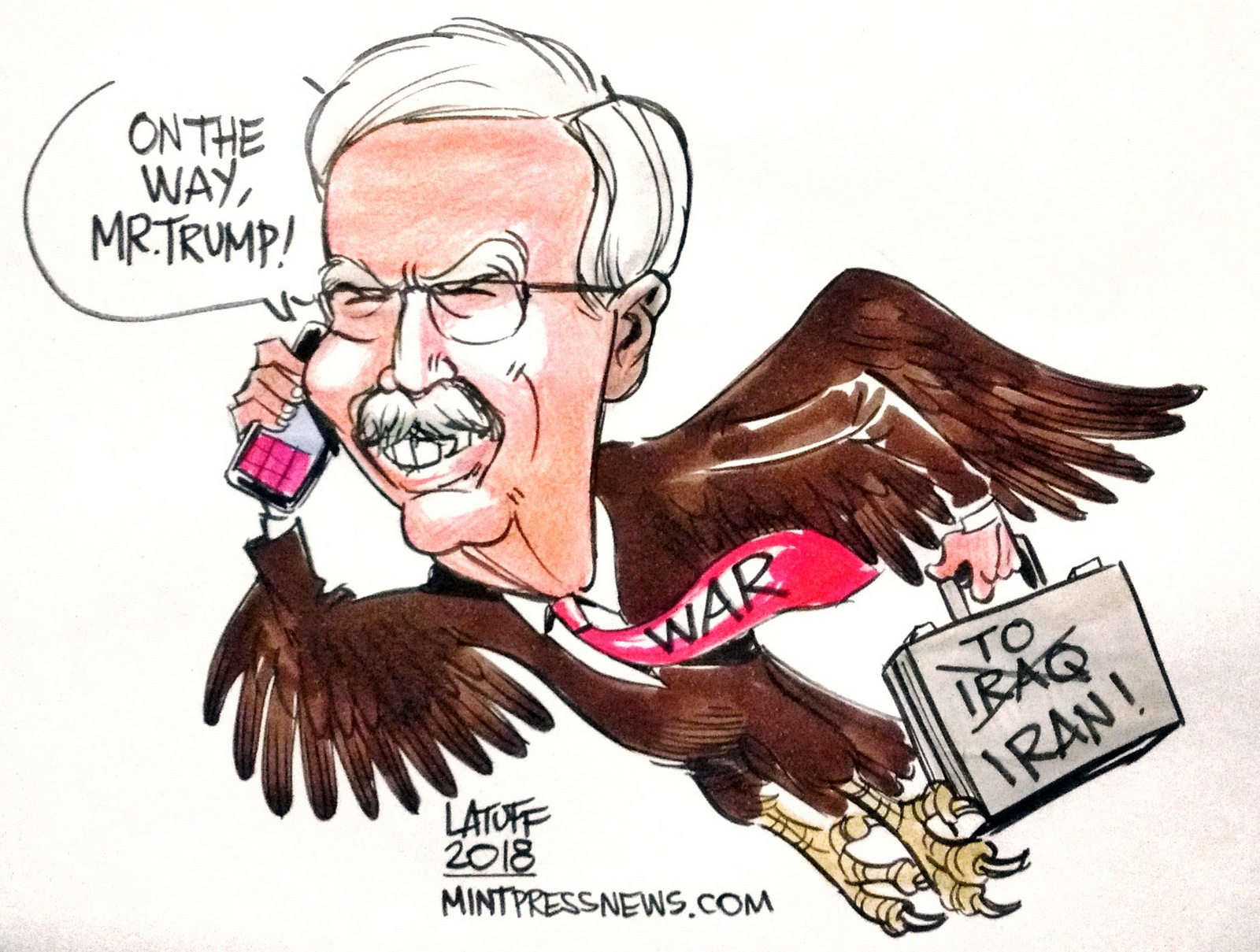This article is Part III of a series exploring the past of soon-to-be National Security Adviser John Bolton and what his appointment will mean for U.S. foreign policy, with a focus on the Middle East, Latin America, and the Koreas. Part I examined Bolton’s past advocacy for Israel, often at the U.S.’ expense. Part II detailed how that same commitment to Israel has shaped his vision for the Middle East, a vision that calls for regime change in Iran, the division of both Syria and Iraq, and the creation of a new Sunni state. Part III explores Bolton’s past and present policies in regards to Latin America, policies which threaten to return the region to bloody legacy of American-backed military coups.
WASHINGTON – While President Trump’s appointment of John Bolton to the position of National Security Adviser has sent shockwaves throughout the country, most of the concern about his likely effect on U.S. policy has been focused on the Middle East as well as the Korean peninsula. Bolton’s appointment has, however, also caused concern elsewhere, particularly in Latin America.
Though he is best known for promoting the invasion of Iraq on false claims of “weapons of mass destruction,” Bolton has also made similar false claims against Cuba, stating that the island nation had a “developmental offensive biological warfare program” in order to include it among the “Axis of Evil” countries. Not only that, but Bolton has also conjured up false claims of Venezuela protecting Iranian “smugglers” in a bid to target its current government. More recently, he has called for “greater U.S. involvement” in the “critical” region of Latin America.
Bolton’s past, along with his recent statements, have made many Latin Americans uneasy. As a former National Security Council member during the Obama administration told the Miami Herald,
He [Bolton] is a warmonger and Latin Americans get nervous when American presidents tend to lean toward military versus diplomatic solutions. It’s a militaristic style that won’t go down well in Latin America.”
Bolton’s troubling role in Iran-Contra cover-up
The Iran-Contra affair, perhaps the best-known scandal of the Reagan era, saw the U.S. government facilitate the sale of arms to Iran, then under a weapons embargo, in order to covertly fund the Contras – “rebels” who launched a campaign of terror in Nicaragua in attempts to oust the leftist Sandinista government — after U.S. support for the group had been outlawed by Congress. When the scandal broke, many Reagan officials sought to mitigate the damage and launched a cover-up.
One of those officials who played a key role in hiding U.S. support for death squads in Nicaragua was John Bolton, then serving as Assistant Attorney General under Edwin Meese. When then-Senator John Kerry agreed in May 1986 to provide the Justice Department with information compiled by his staff showing that Nicaraguan contras and their U.S. backers had “engaged in criminal wrongdoing,” Bolton at the time had promised that such evidence would be “vigorously and expeditiously investigated.”
Read more by Whitney Webb
- Bad Track Record Gets Worse as New Whistleblower Outed by The Intercept
- Was Nicolas Sarkozy’s Role in Taking Out Gaddafi More Personal than Geopolitical?
- The Media’s Curious Coverage of the “Second Snowden”
- Scream Loudly and Carry a Nuclear Arsenal: The Dangers of Trump’s “Nuclear Diplomacy”
However, Bolton buried the information – refusing to comply with congressional requests for the information he had received from Kerry and other sources, and also refusing to testify. Bolton claimed that the information requested by the House Judiciary Committee was “highly classified” and that no member of the committee has the “proper clearances” to review it. Bolton continued to block government probes by refusing to cooperate with document release requests and invoking executive privilege. He later referred to efforts to destroy information allegedly pertaining to the Contra affair as “house cleaning” chores so the George H.W. Bush administration could come in with “a clean slate.” Bolton then served in the State Department during Bush’s presidency.
In addition, John Bolton is a long-time associate of the D.C.-based Covington & Burling law firm, which has a sordid history of lobbying for coups in Latin America. Most recently, Covington came under scrutiny for its role in the 2009 military coup that ousted Manuel Zelaya in Honduras. When Zelaya raised the minimum wage, Chiquita fruit company paid $70,000 in lobbying fees to Covington, whose long-time partner – Eric Holder – was serving as Attorney General at the time. Chiquita, whose previous incarnation successfully lobbied for the 1954 military coup in Guatemala on similar grounds, saw their lobbying pay off when the U.S.-backed military coup in 2009 removed Zelaya from power. Hillary Clinton, then-Secretary of State, has openly admitted the role of the Obama administration in the coup.
Bolton extended WMD lies to Cuba
In addition to Bolton’s past connections to scandals involving Latin America, he has had a direct role in pushing for military invasions based on false claims of “weapons of mass destruction,” similar to those that led to the invasion of Iraq.
Bolton, long an advocate for increasing the already strong restrictions against Cuba that were in place at the time, lobbied the George W. Bush administration to add the island nation its “axis of evil” while serving as Undersecretary of State for Arms Control and International Security. The justification that Bolton offered for adding Cuba to the list was his claim that Cuba was covertly developing biological weapons. In a speech to the conservative think-tank the Heritage Foundation, Bolton asserted that “Cuba has at least a limited offensive biological warfare research and development effort.”

He originally wrote the speech, however, as saying that Cuba “has a developmental offensive biological warfare program and is providing assistance to other rogue state programs,” but concern from other high-ranking officials in the State Department forced him to tone it down. Price Floyd, then a State Department media-affairs official, recalled that there was “no evidence” for Bolton’s claim. Three years later, U.S. intelligence concluded that “it is unclear whether Cuba has an active offensive biological warfare effort now, or even had one in the past.”
After making this baseless accusation, Bolton tried to pressure intelligence officers and government analysts to endorse his statements. Bolton did not take rejection well and, in one case, when an analyst at the State Department’s Bureau of Intelligence and Research (INR) refused to endorse the statement, Bolton scolded him in “a red-faced, finger-waving rage” and tried to have the analyst reassigned.
Instead of being demoted or fired for his distortion of intelligence and abuse of subordinates and other who disagreed with him, Bolton was instead promoted and in 2005 became U.S. ambassador to the United Nations, where he regularly criticized Nicaragua, Cuba and Venezuela as “undermining U.S. interests throughout the region.”
Having supported a coup in Venezuela before, will Bolton do so again?
Bolton’s most belligerent stance against any country in Latin America has been reserved for Venezuela. Bolton has long criticized the Venezuelan government, first under Hugo Chávez whose presidency he called a “comic-opera,” and then under Chávez’s successor, Nicolás Maduro, whom he has called “dimwitted.” While serving in the State Department in 2002, Bolton actively favored the failed U.S.-backed coup against Chávez.
Since ending his stint as ambassador to the United Nations, Bolton has accused Venezuela of harboring and collaborating with Iranian criminals and “smugglers.” During a 2013 hearing, Bolton claimed that Iran was operating in Venezuela to avoid international scrutiny.
“These are expert smugglers with — the largest Iranian diplomatic facility in the world is in Caracas, Venezuela […] they are laundering their money through the Venezuelan banks.” He has since asserted that Iran uses Venezuela “to retain access to the country’s extensive uranium reserves.”
Bolton has never presented any evidence to support these claims.
Bolton has also claimed that the Lebanese political party Hezbollah is a “murky but continuing threat” in Venezuela. Claims of Hezbollah’s involvement are based solely on the ancestry of Venezuelan Vice President Tareck El Aissami, who is of Lebanese heritage. Bolton subtly admits this, stating that Hezbollah’s alleged presence in Venezuela is due to “the long history of expatriate Middle Eastern trading networks in Latin America.”
These baseless claims invented by Bolton regarding illicit activities of Iranian and Lebanese origin taking place in Venezuela have become frequent talking points of the Trump administration. Last August, Mike Pompeo – then head of the CIA – asserted that Venezuela was overrun with Iranians, Hezbollah and Cubans.
In addition, U.S.-backed regime change in Venezuela – which Bolton also advocates — has become increasingly likely under Trump. In February, Rex Tillerson – then serving as Secretary of State – stated that he believes it is likely that the Venezuelan military will remove Venezuelan president Nicolás Maduro, suggesting that the military could be an “agent of change” in the country. Prior to Tillerson’s statements, Trump threatened to invade Venezuela and Vice President Pence had claimed Venezuela as a “threat” to the U.S.
However, those who think Tillerson’s oblique calls for a military coup in Venezuela will fade now that he has left his post at the State Department are likely mistaken. Pompeo, who will replace Tillerson, hinted last year while serving as CIA director that the agency was working to change the elected government of Venezuela.
In addition, Senator Marco Rubio (R-FL), who himself recently called for the Venezuelan Armed Forces to rebel against the country’s government, praised Bolton’s appointment. “I know John Bolton well,” Rubio stated, “and believe he is an excellent choice who will do a great job as national security adviser.”
Objectivity and respect for international law not likely
Bolton’s appointment to the position of National Security Adviser — a highly placed official expected to marshal national security information and present it objectively to the president — has caused shockwaves within the United States and beyond. Bolton’s track record of both blocking and distorting intelligence that doesn’t suit his agenda does not bode well for those countries that Bolton has long targeted for regime change, as it suggests that he will do anything to topple governments he doesn’t like, even if it means both presenting information selectively rather than objectively and “disparaging international law.”
As a result, Bolton’s history and recent statements show that he has no qualms with returning to the U.S.’ dark and bloody history in meddling in the affairs of Latin American countries.
Top Photo | John Bolton, former US ambassador to the United Nations, speaks during the “‘Energy Independence Day Tea Party” rally on Independence Mall in Philadelphia, Pennsylvania. Monday July 4, 2011. (Dennis Van Tine/MediaPunch/IPX)
Whitney Webb is a staff writer for MintPress News who has written for several news organizations in both English and Spanish; her stories have been featured on ZeroHedge, the Anti-Media, and 21st Century Wire among others. She currently lives in Southern Chile.


